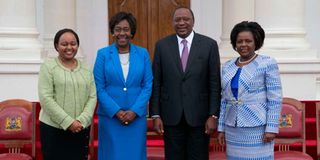Time for political parties to give women equal space

President Uhuru Kenyatta with governors (from left) Ann Waiguru, Charity Ngilu and Dr Joyce Laboso during the 6th session of the National and County Governments Co-ordinating summit at State House, Nairobi.
What you need to know:
- Most influential political party positions are held by men.
- The election of Ms Ann Waiguru and the late Dr Joyce Laboso as governors in 2017, was made possible by the fact that their party, Jubilee, supported them even as they were decisively elected by their people.
- Barriers that exclude women can be removed ahead of the 2022 election if political parties are fair, accountable and transparent.
The unpredictability of Kenya’s electoral scene, months ahead of a General Election, particularly on political party loyalty and affiliation, cannot be gainsaid.
What is predictable though, is the reluctance by political parties to nominate women not only to contest the presidency but also to other positions. This unwillingness, a breach of the law, has been the greatest contributor to the low number of women in mainstream politics.
To make this issue worse, most influential political party positions are held by men. It goes without saying that where there is political will in parties, women easily come out for nomination, to contest whatever seats they deem suitable for them. The Social Democratic Party (SDP) emerged as an example in 1997. The party, which had prominent and qualified senior members including now Kisumu Governor Prof Peter Anyang’ Nyong’o, opted to field Ms Charity Ngilu as its choice for presidency.
Ms Ngilu (current Kitui Governor) had then served for only a term as MP for Kitui Central. Although she did not win, she made a mark and emerged fifth in the election. Prof Wangari Maathai, who was also in the same presidential race making history with Ms Ngilu as the first women in Kenya to contest the same, ran on a party she had control of, The Liberal Party of Kenya, (LPK).
Decisively elected
Today though, some women who have been able to get their party ticket to the top seat and even in other seats, like Martha Karua (Narc Kenya) and Ms Ngilu (Narc), have done so through the parties they lead. The election of Ms Ann Waiguru and the late Dr Joyce Laboso as governors in 2017, was made possible by the fact that their party, Jubilee, supported them even as they were decisively elected by their people.
The exclusion of women and lack of political will in political parties to nominate women is manifested in many ways, including, intimidation, male domination and party structures that favour men. These barriers can, however, be removed ahead of the 2022 election if political parties are fair, accountable and transparent.
To ensure this is not given lip service, political parties must be forced to abide by the Political Parties Act and Regulation. They must also be obligated to implement the two-thirds gender rule in their structures if the political field will be level as we gear towards a General Election. However, its success will be determined by political goodwill from parties’ top leadership as shown by recent activities.
An example is the election of Ms Agnes Kavindu Muthama to the Senate. She was roundly supported by the leadership of Jubilee and Wiper Party. The seat, like in the case of the other women mentioned above, did not come to them on a silver platter. All the political parties did is to remove the barriers that are always thrown in the way of women seeking elective seats.
Fair representation
This fairness too, should be extended to ensure vacancies created when women leaders get incapacitated or die while in office are retained by that gender to protect the political gains made and ensure diversity and fair representation, not just in political leadership, but in all spheres of our society.
In almost all instances where such vacancies have sadly occurred through death like in the case of Dr Laboso and Ms Grace Kipchoim - who died in April 2018 while in office as Baringo South MP, their successors were men. In the case of Dr Laboso, while the law is clear the deputy takes over, one would have expected that the new governor would have appointed a woman as his deputy.
To replace Ms Kipchoim, Baringo South voters elected a man. With political will, however, parties can ensure and facilitate fairness of gender in elections. Kericho governor, Prof Paul Chepkwony has done well to nominate Ms Lilly Chepng’etich Ngok as his deputy to replace the late Susan Kikwai who succumbed to Covid-19 on March 20, 2021.
Nonetheless, the (BBI) Constitution of Kenya (Amendment) Bill 2020, which aims at amending the Constitution by “popular initiative”, proposes some changes to the document, which if passed and adopted, would be binding in ensuring the two -thirds gender rule is respected.
As such, the proposal to amend Article 82 (1) to provide for sanctions for a political party that fails to comply with the principle that not more than two-thirds of the party’s candidates are of the same gender, will ensure fairness to both female and male party members.
Njeri Rugene is a Journalist and founder, The Woman’s Newsroom Foundation. [email protected]





